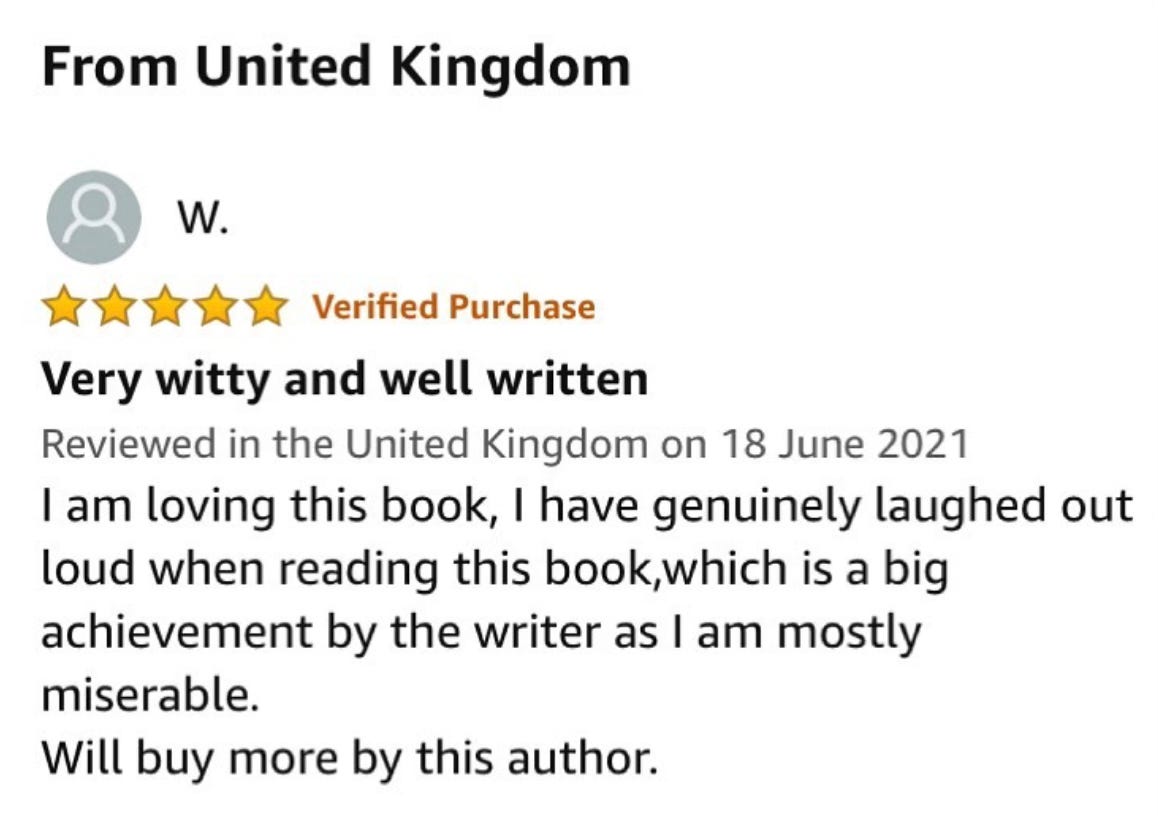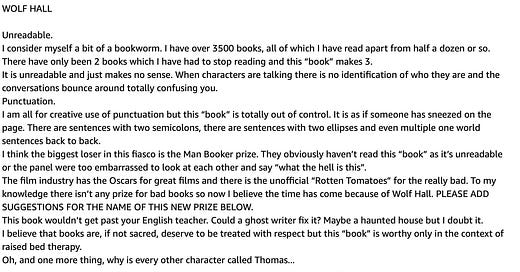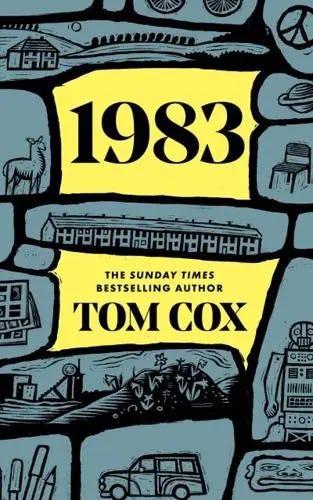Why Reading Online Reviews Of Your Book Will Lead You Nowhere Good
Even if you can't avoid doing it sometimes
I try my best not to read website reviews of my books. Even the nice ones. I haven’t looked at GoodReads since about 2017-18 because I know it’s not going to improve my life even fractionally, and while I haven’t been able to resist finding some of the more dramatically damning and/or illiterate Amazon reviews of my books hilarious in the past, my general feeling is that reviews are none of my business. Sometimes, though, without going full Black Narcissus and spending all day every day meditating on top of one of the Himalayas, it’s simply impossible to totally avoid seeing your reviews.
On Thursday morning I was looking for a link to include in my previous newsletter and happened to notice a couple of not especially favourable or comprehending customer reviews of my new book. At least, the reviews said they were of my new book, but the words within them had little connection with the book I feel fairly sure I have written. Who knows how the reviewers had got hold of it, as it’s not out until August 8th. I imagine it was some kind of trade freebie proof deal that I had no knowledge of. Anyway, the complaints within mirrored those I always pre-write in my head by the hypothetical people who will read my books who my books aren’t written for. Essentially: the reviewers thought my new novel was too “weird”, too eclectic, had too many narrators, too much movement through time, not enough (over) explanation of events. In other words, all the exact things that I love playing with when I write a book, and the exact things that I know from experience that people I write my books for often most appreciate about them. People like the woman who made my day by collaring me after an event in Cornwall last year and telling me: “You know what I love about your books? It’s that they do my head in, in the absolute best way.”
When I saw those two reviews I was reminded of another time I accidentally read a - vastly more negative - review of one of my earlier books. The person who’d posted it seemed so surpassingly pissed off with my writing that I couldn’t help becoming intrigued enough to go on a small anthropological mission to get some sense of what made him tick by clicking on his profile and finding out what other stuff he’d read. One of his reviews was of a Cormac McCarthy book - one of the most richly, darkly imagined and technically brilliant novels I’ve ever read. He’d given it one star out of five and called the Pulitzer Prize-winning McCarthy “incompetent”.
There is no book you can write that everyone will like. That book will never exist and, if it did exist, it would in fact probably be the most pointless book ever (although some people would probably think it was sort of ok and buy it at Christmas for a relative of an incurious disposition). No matter how much you put into your writing, no matter how happy you are with the result, you are going to make somebody angry, or confused, or prompt them to try to alchemise some of their own personal unhappiness into a put-down aimed at you.
I think the first time I fully realised this was when I saw a review of Hilary Mantel’s Beyond Black complaining that it was “terribly written”.
I loved Beyond Black but I absolutely accept that not everyone would enjoy it. What I do not accept is that it is “terribly written”. Nor do I accept the view that Cormac McCarthy’s writing is “incompetent”. These are the intimidated verdicts of people who are simultaneously too stupid and too judgemental to see the unique imaginative brilliance of the book they are reading.
“A bad review may spoil your breakfast but you shouldn’t let it spoil your lunch,” Kingsley Amis said. But back when I was first writing books I remember the odour of bad reviews - somewhere between school bully halitosis and what might fill your nostrils if everything in your immediate environment you’d assumed was wholesome began to suddenly, violently rot - lingering beyond supper. So what is the difference now? I still do catch that stench on the breeze from time to time. But a few valuable nuggets of hard-earned knowledge and self-knowledge mean it no longer invades my personal space in quite such a pungent fashion:
I am aware that there are people who like my books a lot. These people tend, in my experience, to be the precise kind of people I write my books for. They have been a vital contributing factor to my growing confidence as an author: the confidence that enables me to see when a damning dismissal of my work is less about the work and more about the person dismissing it. But the deeper connection I make with these valued people - and myself - via my writing, the more I will inevitably alienate people who fundamentally don’t get it. Five star reviews and one star reviews are often two sides of the same coin.
I am sure plenty of people who don’t properly know me dislike me. As I get older, I am increasingly fine with that. These people also would undoubtedly dislike my books. I’m fine with that too. I’m not going to try to hurt these people, either in person, or via my books, but I’m not part of the relationship they believe they have with me so it’s not up to me to try to make reparations to it.
To get your book out there to its intended audience invariably involves a potentially thorny journey via its unintended one. It’s going to happen, and there’s no getting away from it. At least, not unless someone sets fire to the internet.
We live in an age that gives a platform to all kinds of voices that once didn’t have a platform, which is, as we all see every day, a brilliant and horrific thing. Sometimes these once-hidden people are angry and bitter about their lives and looking for an outlet for the anger and bitterness. Sometimes the outlet is a book they read or part-read or didn’t actually read at all. Sometimes ripping apart that book, in a place where strangers across the globe can read their comments, is the one activity that can make them feel momentarily like Scarface.
Part of trying to get on quietly and diplomatically in life and not clash with people is keeping up the pretence that fuckwits don’t walk among us in the world, but sometimes you just have to face up to the reality of the situation: Fuckwits do walk among us in the world, and they are not thin on the ground.
You could ask your publishers to put advisory stickers on your books saying “NOT FOR FUCKWITS” to try to save yourself some hassle but it’s unlikely they’d be cool with it.
I have read plenty of books I didn’t enjoy. So have my friends. To my knowledge, none of us have ever taken to the internet afterwards and, on the basis of 20 pages, written a review of one of those books in a manner that suggests we believe our opinion to be The True Way Forward and that we are doing humanity a great service by correcting its failings, one by one. We generally just quietly move on and read a book we like more.

What I usually notice these days when I accidentally see a negative or nasty review of one of my books is that it comes at me, in my head, as part of an eerie chorus, like the kind sung by some sinister mind control cult. What the chorus is singing is this:
“Water it dddddown. Make the voice less yyyyyou.”
And when I hear that chorus, I will continue to do the absolute opposite of what it is asking. Because it is exclusively the opposite of it that will help me improve and grow as a writer. The opposite of it is the only thing that will mean that I continue being fulfilled and excited while I write and open to the deepest, most timeless magic of the process. Because that is the precise point of writing in the first place.
I will not insult the intelligence of my readers - my real readers, the ones I write my books for - by explaining what does not need to be explained.
I will not worry about people who complain that my books are “too weird”, just as the people who created my favourite books and records and paintings and films did not give a fuck about people thinking they were weird.
I will not be another uninspired cog in the current machine, another contributor to the sense, that, as if hypnotised by AI, humans themselves are trying to become more AI: all listening to the same songs, all using the same buzzphrases, thinking the same thoughts, and perhaps, potentially, as a result, feeling an insidious pressure to all write the same books. Why would I do that, when there is such a dizzying, inexhaustible, diverse range of wonder and magic and deeply individual art in the world to draw from?
I will write the book I need to write, and not give a fuck about the tiny lives and judgements of the people it isn’t written for.

Can a critical review help you improve as writer? Perhaps. But if it can, it will probably be a critical review by someone who understands what you’re trying to do with your writing and is constructively sympathetic to just what a vulnerable and draining baring of the soul writing a book inherently is. It will not be a review by an unhappy wankshaft whose chief hobby is yelling at clouds. I remember, back just before I tried to stop reading my reviews, a reviewer on a website, as well as taking issue with my hobbies and (what they’d concluded were) my political leanings, had a go at me for having curly hair. What did they expect me to do? Get some straighteners? Would that have made my writing more to their taste? Did they realise that hair can’t write books?
Authors do not have to be for everyone, despite the elements of our culture that conspire to attempt to convince us otherwise. We are not politicians. We do not have to think about “the many” as we write. It’s perfectly fine to think about "the few”.
Getting the straighteners out will lead nowhere productive.
Picture someone you’ve met in person who you really didn’t like. Would you want them to enjoy your book? No, of course you wouldn't. Why on earth would you want to write a book for a gigantic pissface like that?
It doesn’t matter what you write or how you go about it; somebody somewhere is inevitably going to hate it. That’s not something to be fought. It is, if anything, something to be embraced.

You can order my new novel, 1983, which will no doubt receive some, and possibly lots of, horrible customer reviews online, here, with free international delivery.









“Fuckwits do walk among us in the world, and they are not thin on the ground.”
I am undecided whether to carve this pearl over my front door or to stitch it on a cushion, surrounded by blousy roses and a kitten or two.
Perhaps I shall accomplish both.
“You could ask your publishers to put advisory stickers on your books saying “NOT FOR FUCKWITS” - Tom this is genius